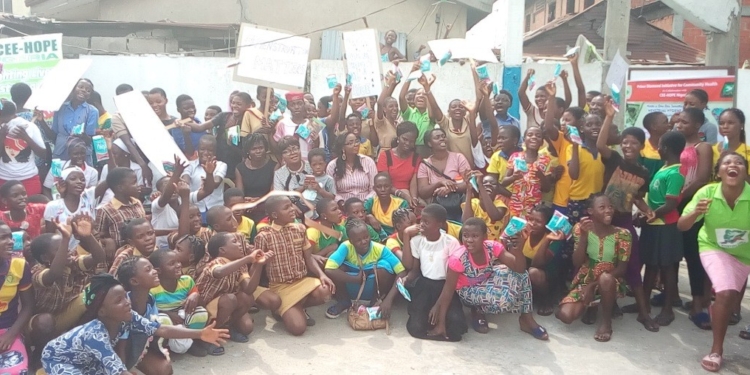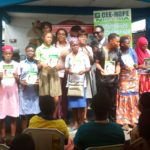As part of activities marking the recent World Menstrual Hygiene Day, two Non-Governmental Organisations (NGOs) sensitized more than 200 school girls in Makoko, Lagos on menstrual hygiene management and utilised the occasion to abdicate for free distribution of sanitary products to needy women and girls.
The organisations, Prime Diamond Initiative for Community Health (PDICH) and the Center for Children’s Health Education Orientation and Protection (CEE-HOPE) hoped the World Menstrual Hygiene Day will help in boosting women and girls’ accessibility to sanitary products.
The event which had in attendance several facilitators who mentored the girls for several hours on staying healthy and clean during their menstrual flow also witnessed the distribution of free sanitary products and books to the girls.
Betty Abah, founder, CEE-HOPE Nigeria explained that the event, besides the lectures and distribution, was also to draw attention to the urgent issue of access to sanitary products by women and girls worldwide.
‘Poor and vulnerable women and girls worldwide, women and girls in detention, IDPs and asylum seekers have difficulties accessing menstrual products to tackle the monthly inevitable and it is an issue worthy of global attention,’ she said.
According to Abah, statistics have shown that one in 10 African girls miss school due to periods, and many women and girls enter transactional sex as a result of their vulnerable positions and to be able to afford these products. She therefore canvassed for free distribution of sanitary pads in light of the worsening economic situation in the country.
‘If governmental agencies and NGOs can encourage and actually distribute free condoms why haven’t they thought of the need to give out free sanitary products? While sex is a choice, periods are not,’ she added.

 Millions of poor women and girls worldwide lack access to sanitary products. According to Hey Girls, a United Kingdom-based organisation, 137, 700 girls miss school in the UK every year due to ‘poverty period’.
Millions of poor women and girls worldwide lack access to sanitary products. According to Hey Girls, a United Kingdom-based organisation, 137, 700 girls miss school in the UK every year due to ‘poverty period’.
Yinka Kenny, founder of YinkaKenny Girls Care Foundation who was one of the facilitators encouraged the girls not to be ashamed about their monthly cycle as it was a natural process. She emphasised personal hygiene to the girls who were drawn from eight schools across Makoko, Nigeria’s largest slum community where CEE-HOPE operates much of its programs.
Catherine Onebunne, project officer of Prisoners Rehabilitation and Welfare Action (PRAWA), Lagos State chapter, taught the girls on the need to be knowledgeable about their menstrual cycles. Ogechi Ikeanyanwu, an award-winning journalist with the Cable News, Nigeria and Emmanuel Agunze, founder of the NGO, Makoko Dream, also offered tips and counselling to the students who were mostly teenagers.
 In appreciation, one of the girls, Thomas Serah thanked organizers of the program which she described as immensely helpful to them. Thomas who earlier spoke on her plight to get sanitary pads, said she had had to miss school lunches, saved monies given her by her parents so she could gather enough to buy pads as sometimes her parents have no money to give her to buy pads during her period.
In appreciation, one of the girls, Thomas Serah thanked organizers of the program which she described as immensely helpful to them. Thomas who earlier spoke on her plight to get sanitary pads, said she had had to miss school lunches, saved monies given her by her parents so she could gather enough to buy pads as sometimes her parents have no money to give her to buy pads during her period.Abah thanked PDICH for sponsoring the event and for the sanitary pads and books distributed.







Comments 1